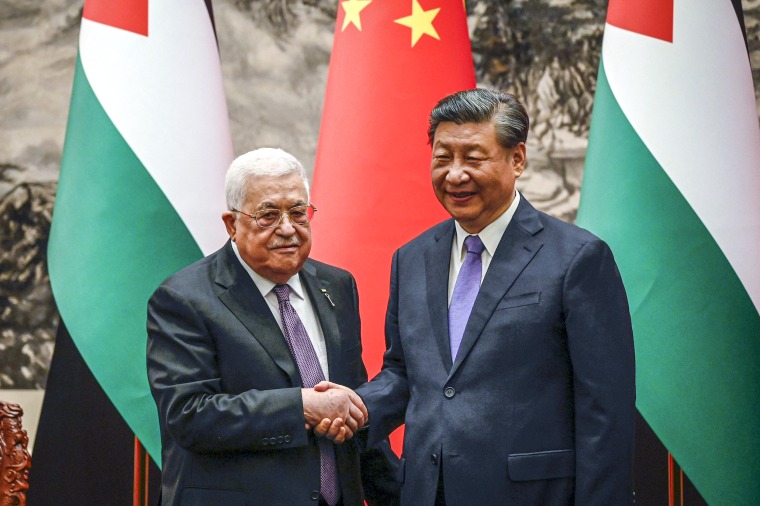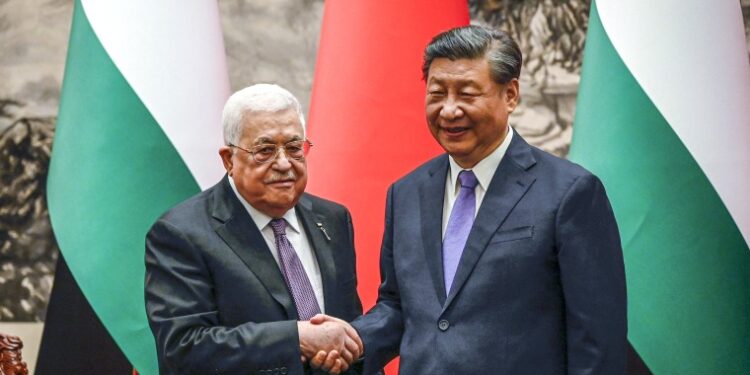China has made no secret of that goal. In May, Chinese leader Xi Jinping told a meeting of diplomats from China and Arab states here that “war should not continue indefinitely.” Xi reiterated Beijing’s support for a “broad-based, authoritative and effective international peace conference,” as well as China’s call for the establishment of an independent Palestinian state.
China is also expected to seek out a role in postwar Gaza to help rebuild infrastructure. Diplomats including Cao Xiaolin, China’s ambassador to Qatar, and envoy Wang Kejian met in March with Hamas’ political leader, Ismail Haniyeh.
Hamas released a statement stating that Chinese officials told Haniyeh, “Hamas is part of the Palestinian national fabric and China is keen on relations with it.”
It is a delicate balance for China as it also has diplomatic relations and trade ties with Israel, though officially Beijing has never condemned the Oct. 7 attacks.
“China is not proffering itself as mediator between anybody and anybody else,” said Mehdawi. China “cannot call for a peace conference where the Palestinians themselves are not fixing their home.”
Being the potential guarantor of a Palestinian unity agreement would be a win for China, after joining Oman and Iraq to broker a deal last year between Saudi Arabia and Iran that restored full diplomatic ties between the rivals. There was no U.S. or European involvement.
“China wants to be a part of whatever grand diplomatic jamboree ends this conflict, and it would like to be a prominent part of that,” said Jon Alterman, senior vice president and director of the Middle East program at the Center for Strategic and International Studies.
“For the most part, China sees this as a relatively inexpensive way to do something,” he said. “If it works, it is prestigious, and if it doesn’t work, it’s no harm, no foul.”

Palestinian unity has been elusive. Power struggles have long split Fatah and Hamas, a divide that deepened in 2007 with Hamas’ chaotic takeover of the Gaza Strip following elections the year before. The rupture has since left the Fatah-dominated Palestinian Authority governing only parts of the West Bank and doing so amid complaints by Palestinians of eroding legitimacy, according to a 2023 study by the Palestinian Center for Policy and Survey Research, an independent think tank in Ramallah. Israel has exercised power over both the West Bank and Gaza in different ways.
The talks in Beijing will be held at the Diaoyutai State Guesthouse, a sprawling compound of gardens, lakes, buildings and a hotel where the Communist Party receives foreign dignitaries. It will bring together a delegation of senior officials from Fatah including its deputy chairman, Mahmoud Aloul, with Hamas counterparts led by Haniyeh.
China’s Foreign Minister Wang Yi will meet with both sides, a Chinese Ministry of Foreign Affairs spokesperson said when they confirmed the meetings. The factions will also meet without Wang, who is China’s top diplomat, but there is a plan for him to rejoin on the last day, according to Palestinian officials familiar with the schedule.
Acknowledging the talks in advance, for China, suggests a different level of confidence in what they might yield. A first round of meetings took place here in April with little progress, and China announced them only after the participants had finished and left the country. The Beijing discussion followed a similar meeting in Moscow in February.
When the time came for Chinese officials to host the planned second round of unity talks here on June 24, Hamas and Fatah pulled out at the last minute. Both factions issued statements that blamed the other for rejecting the meeting and expressed “appreciation” to their Chinese hosts.
“The historical divide between Hamas and Fatah is deep,” said Maria Papageorgiou, a lecturer in politics and international relations at the University of Exeter, “China’s direct influence on Palestinian politics remains limited compared to other players.”
China’s relations with Palestinians date back to the 1960s, when the government under Communist Party Chairman Mao Zedong provided food, weapons, training and support to the Palestine Liberation Organization (PLO).
In 1988, China was among the first countries in the world to recognize a Palestinian state, and its representative office in Beijing was converted to embassy level in 1974. These days, Palestinians rely on China primarily for diplomatic support at the United Nations, according to officials.
Those PLO ties have long been entwined with China’s push into the Middle East, driven mainly by economic interests that have expanded its foreign policy influence, too. Much of Beijing’s crude oil imports come from the region, and Chinese investment has funded billions of dollars in infrastructure projects including ports, highways and skyscrapers.
“Although China has gained significant economic presence in the Middle East, its [diplomatic] credibility does not always match its influence,” said Papageorgiou, adding that China’s now-strained relations with Israel over the conflict will make it difficult to facilitate conversations between Palestinians and Israelis without U.S. involvement.
In a statement to NBC News, China’s Ministry of Foreign Affairs maintained China has “always firmly supported the just cause of the Palestinian people.” Without naming the U.S., it went on to say, “China calls on influential major countries to ‘take off their tinted glass’ and abandon ‘double standards’ when dealing with regional affairs.”
“China’s worldview is not that you have a strong international community that advances common interests,” said Alterman. “China’s preference is to engage one by one, so to the extent that China undermines this broader effort to encourage multilateralism, I think the United States considers that to be unhelpful.”
Mehdawi, the Palestinian ambassador, does not see China vying to replace the U.S. as the dominant power in the region when it comes to diplomacy. Instead, he regards China’s involvement with unity talks as filling a role the U.S. is unable to undertake given its support for Israel.
“Chinese foreign policy is not so ambitious,” he said. “They know their limitations. Failures of the U.S. are making it appear that China is doing more.”
“When you leave a space, somebody will take it.”







